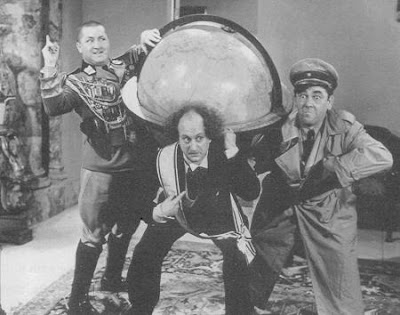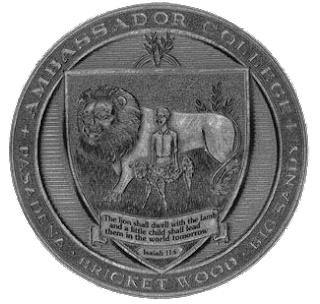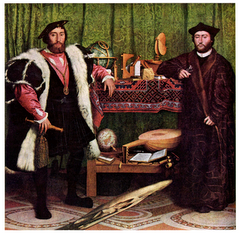 The WCG Canadian Board, at the WCG Canada Annual Board meeting in Montreal June 1st, 2008, voted unanimously to cave in and repeal-completely abolish! -the entire Canadian WCG Policy Governance Manual, at the directive of the Pastor General. By what secret written authority, or power claimed by a reform school Pastor General, does Tkach do this?
The WCG Canadian Board, at the WCG Canada Annual Board meeting in Montreal June 1st, 2008, voted unanimously to cave in and repeal-completely abolish! -the entire Canadian WCG Policy Governance Manual, at the directive of the Pastor General. By what secret written authority, or power claimed by a reform school Pastor General, does Tkach do this? The Canadian board had formally adopted the board policy governance model advanced by John Carver, only four years ago - in 2004, trumpeting the Canadian board policy as a desired change for a reformed Canadian WCG.
The Canadian board discussion and vote to rescind the Carver policy of governance came from procedures and directives ordered by the "parent" of the Canadian WCG, known as the "Worldwide Church of God USA ("the Denomination")". Because the WCG has not published its organizational constituent documents in years, it is not specifically known if the "parent" of the Canadian WCG refers to the California religious corporation founded by Herbert W. Armstrong in 1948, or the parent umbrella, unincorporated, international church Association, specifically created by Armstrong in the WCG church bylaws, for which Joseph Tkach Jr. claims to rightfully be the lifetime religious Pastor General.
With himself as Pastor General at the controls of the unincorporated WCG church association's board of elders, the bottom line is he personally appoints, at his sole discretion, all those whose votes he actually controls. Maybe that's why there is no prominent WCG webpage- covering the Board of Elders of the WCG Association, their supposed powers or legal oversight responsiblities as defined in WCG church articles and bylaws, or even their qualifications for the job (other than being a Tkach crony). And the only ballots that truly count in the WCG "denomination" are the votes taken by the Board of Elders of the Church Association. Only the Board of Elders, under the voting control of the Pastor General, have the authority to ultimately decide denominational governance matters. The recent move to eliminate the Carter model of policy governance internationally may be a move to solidify and buttress his legal position, if the WCG breaks up into further pieces. Or, it could mean a major change is in the offing for the constitutent documents which control the way the denomination is to be run- namely, the WCG unincorporated church association's articles and bylaws. Supposed upcoming changes to be made are noted in the present WCG Policy and Procedure manual.
The present WCG unincorporated church association bylaws below were voted and signed into WCG Church Law on Feb 21, 1986 (which is the most recent copy obtainable) by Joseph W. Tkach Sr. They were first enacted into WCG Church Law by predecessor "get the Church back on track" Herbert W. Armstrong, through his "dummy" oversight Board of Elders on June 30, 1981.
The unincorporated church association bylaws give important legal definitions to the following terms within the WCG church association (my comments or emphasis are in red, WCG church bylaws text default in black):
BYLAWS OF THE CHURCH OF GOD (a/k/a WORLDWIDE CHURCH OF GOD) AN UNINCORPORATED ASSOCIATION
1.1 "Church" shall mean and include the Church of God, a/k/a Worldwide Church of God, an unincorporated association. (Note here the term "Church" is defined as referring to the Worldwide Church of God, which Church is specifically defined here to include an unincorporated association. Churches may choose to organize themselves as associations; and may or may not prefer to incorporate the church association in question. Lack of incorporation of his church association provided Armstrong greater secrecy and less possibility of governmental intrusion. Even though unincorporated at the highest level, church associations may choose to govern themselves with sets of formal, written articles and bylaws. Church associations may also form affiliated religious corporations with which to conduct business (as was the case of the WCG California incorporation in 1948), or to form religious schools and colleges.)
1.2 "Church Authority" (meaning Tkach) shall mean and include the power and authority vested in the Pastor General and his duly authorized delegates, and in the event that either of the conditions occur set forth in §5.4 and §5.5 of Article V of the Articles of Association (Note reproduced here are the Bylaws (and not Articles) of the Unincorporated WCG Church Association; to my knowledge, the written general Articles governing the unincorporated WCG Church association have never been made public. For example, sections "5.4 and 5.5 of Article V" refer to the most basic WCG church organization unincorporated Articles of Association, which Tkach holds as his secret) (or any corresponding renumbered section or article), then it shall mean and include the Advisory Council of Elders and their duly authorized delegates.
1.3 "Church Law" shall mean and include the Church's Articles of Association, bylaws, (once again the Church's Articles of Association and bylaws are referred to separately here) resolutions, and its ecclesiastical doctrines, Determinations, tenets, rules, customs and teachings, all as they are now in force or may hereafter be adopted, amended or repealed, with or without notice, by the Church Authority. (Church Authority, defined as primarily meaning Tkach - ed.)
1.4 "Ecclesiastical Determination" shall mean and include a decision that requires spiritual discernment. Such decision shall be within the sole and subjective discretion of the Church Authority (meaning Tkach alone has the sole and subjective discretion to make these decisions), shall be conclusive and final, subject to review by the Church Authority(Tkach), and shall not require oral or written evidence as to its basis.
ARTICLE II -- Offices
2.1 The principal Office and other offices of the Church, for the transaction of its ecclesiastical and temporal activities, shall be designated by the Church Authority as they deem advisable according to circumstances.
ARTICLE III - Members
The Classes of Members
3.1 Associational Members. The Association as an entity shall have one class of members. The only members of the Association shall be the Pastor General and the Advisory Council of Elders as it shall from time to time be constituted. (And only Tkach, the Church Authority, has the power to appoint and summarily dismiss Elders of the unincorporated Association for any cause and without a hearing, and only they collectively have the power to make decisions to govern the entire denomination.)
In the interests of determining exactly what section 1.2 above refers to when it mentions specificially "§5.4 and §5.5 of Article V of the Articles of Association", numerically §5.4 and §5.5 of these Bylaws of the Association simply define the place, call, and proper notice for Board of Elders meetings. The subject matter does NOT have to do with the stated conditions in the above bylaw §1.2 on "Church Authority". The WCG church association Bylaws further refer to a specific, §5.5 of the Articles of Association of the Church (see below). This means § 5.4 and 5.5 cannot possibly refer to the WCG California corporate bylaws, which the WCG was already infamously forced to publish in the Worldwide News. Nor could it possibly be referring to church association Bylaw §5.5, which merely defines the call and proper notice requirements for a meeting of the WCG Board of Elders. Sections 5.4 and 5.5 therefore must refer to provisions found in a separate document detailing the WCG unincorporated Articles of Association. For instance, it refers over to the WCG Articles of Association in another church bylaws section besides § 1.2 (as follows in bylaw §5.6) :
---
5.6 "Inability . . . to govern" as used herein and in § 5.5 of the Articles of Association of the Church (another specific reference here over to Articles of Association of the Church - so what does Tkach's complete Church Association law §5.5 provide for, in this incapacitating instance?), shall mean:
---
Based on the foregoing excerpts, the conclusion must be the WCG has certain longstanding Articles of Association of the Church, which Tkach has yet to publish to his worldwide denomination, the terms of which cover many legalities- including Tkach's present term of office as Pastor General, and power relations within the entire multi-national WCG church association. The as yet unseen, and publicly unincorporated, WCG Articles of Association would also deal with such matters as the Canadian Church having, or not having, the right to independently adopt the Carter model of governance. They include still unknown, cultic provisions which deal with all possible future conditions involving the probable inability of the Pastor General to govern the WCG, and the rules which govern precisely how his eventual successor is to be selected by the WCG. This probable inability to govern the WCG becomes higher and the secret selection mechanism for his successor becomes all the more important, as Tkach ages towards his upcoming retirement. Time is running out for both Tkach and Feazell to reform the church association bylaws, if they intend to do so as current church employees.
Since Tkach called for a review and reform study of the church law in the Worldwide News in 1997, isn't it by now time for Tkach to make known at least the secret, cultic, legalistic WCG Articles of Association governing his entire cult? Just how long does it take to complete a thorough review with reform recommendations of the secretly held WCG constituent legal documents? Or to quote WCG bylaw § 5.6, does Tkach have a certain "inability . . . to govern" with credibility, frankness, or moral integrity?













